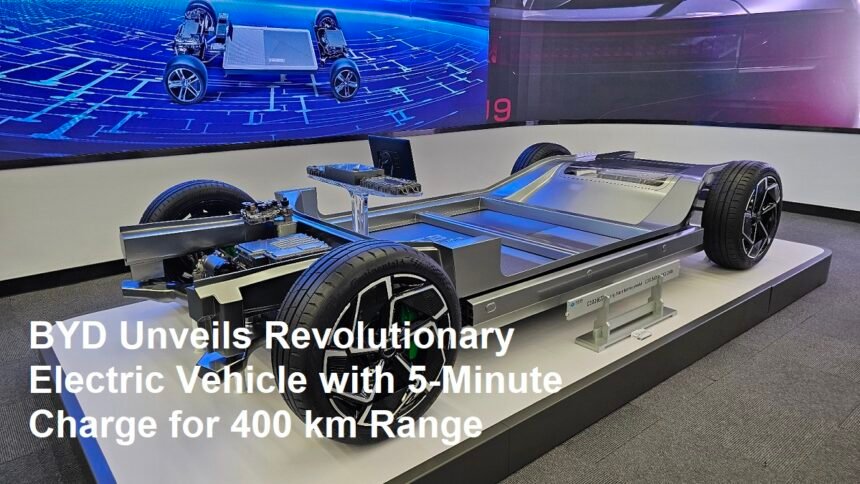In a groundbreaking development in the electric vehicle industry, Chinese automaker BYD has unveiled its latest electric car, boasting a charging capability that redefines rapid recharging standards. Thanks to the innovative Blade Lithium Iron Phosphate (LFP) battery technology, the new model can charge its battery in just five minutes, delivering an impressive driving range of 400 kilometers on a single charge. This breakthrough is set to reshape consumer expectations and industry benchmarks for electric mobility.
The announcement from BYD has generated significant buzz among automotive experts and industry stakeholders. The new vehicle not only highlights BYD’s commitment to innovation but also addresses one of the most persistent challenges facing electric vehicles (EVs): long charging times. Traditionally, EV owners have had to plan journeys around charging station availability and endure long waits. With this new technology, a five-minute charge could effectively eliminate “range anxiety,” making EVs a far more practical option for long-distance travel.
At the heart of this technological leap is the Blade LFP battery. Unlike conventional lithium-ion batteries, which can be prone to overheating and have limited lifespans, the Blade battery is designed to offer enhanced safety, durability, and performance. According to BYD engineers, the battery’s unique design significantly improves thermal management, reducing the risk of overheating while maintaining high charging speeds. The battery’s composition, centered on lithium iron phosphate chemistry, is inherently more stable than traditional alternatives, providing a safer energy storage solution for electric vehicles.
Industry analysts believe that the introduction of the Blade LFP battery could be a game changer for the global EV market. The rapid charging capability addresses a critical hurdle for mass adoption of electric vehicles—charging time. For drivers on the go, the ability to charge in just five minutes is comparable to the refueling times of conventional gasoline vehicles, potentially erasing one of the last barriers to widespread EV acceptance. This breakthrough may also accelerate infrastructure developments, as charging stations can be designed to support ultra-fast charging without compromising battery health or vehicle performance.
In addition to its rapid charging capability, the new BYD electric vehicle is engineered for efficiency and sustainability. The vehicle’s advanced powertrain and aerodynamically optimized design contribute to its extended range and overall performance. Experts suggest that the combination of fast charging and long range could offer a compelling alternative to fossil fuel-powered cars, paving the way for cleaner and more environmentally friendly transportation solutions. This innovation aligns with global efforts to reduce carbon emissions and combat climate change by promoting the adoption of sustainable technologies.
Consumers have expressed a mix of excitement and cautious optimism regarding the new model. Many prospective buyers see the rapid charging feature as a major leap forward, potentially transforming the daily use and long-distance travel capabilities of electric vehicles. “This technology could set a new standard for the entire industry,” remarked an automotive expert. “If implemented on a large scale, it will not only boost consumer confidence but also spur further innovation among competitors.”
While the announcement has been met with enthusiasm, BYD acknowledges that broader adoption of the technology will require upgrades to charging infrastructure. To fully capitalize on the benefits of the Blade LFP battery, charging networks will need to accommodate ultra-fast charging sessions. Industry partnerships and government incentives may play crucial roles in expediting these infrastructure enhancements, ensuring that both urban and rural areas can benefit from the rapid charging revolution.
As BYD prepares to roll out the new model across key markets, stakeholders are keenly watching how this technological advancement will influence the competitive landscape of electric vehicles. With its innovative Blade LFP battery, BYD is not only pushing the boundaries of what is possible in EV technology but is also setting the stage for a new era of rapid, efficient, and sustainable mobility.
Overall, the unveiling of this new electric vehicle by BYD represents a significant milestone in automotive innovation. By drastically reducing charging times while delivering substantial range, BYD is poised to lead the charge towards a future where electric vehicles become the norm rather than the exception.












